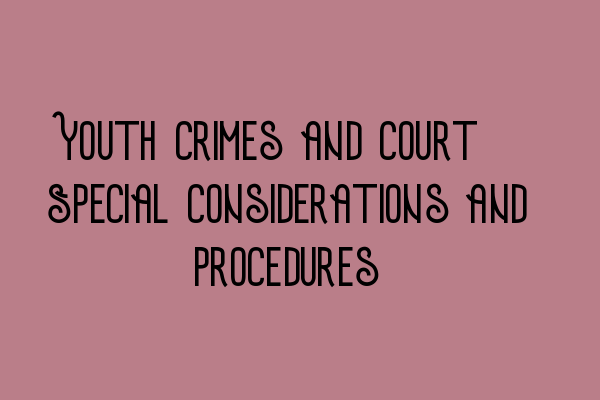Youth Crimes and Court: Special Considerations and Procedures
When it comes to youth crimes, the legal system recognizes that young offenders require special considerations and procedures. The aim is not only to hold them accountable for their actions but also to rehabilitate and reintegrate them into society. In this blog post, we will explore some of the key aspects of youth crimes and court processes, shedding light on their unique nature.
Understanding Youth Crimes
Youth crimes refer to offenses committed by individuals who are below the age of 18. These crimes can range from petty theft and vandalism to more serious offenses such as drug-related crimes or violent acts. It is important to remember that young offenders may be influenced by a variety of factors, including peer pressure, family dynamics, or socio-economic circumstances.
When dealing with youth crimes, it is crucial to approach the situation with a rehabilitative mindset, focusing on addressing the underlying issues rather than solely punishing the offender. This approach acknowledges the potential for growth and development in young individuals, giving them a chance to course-correct and become productive members of society.
The Youth Court Process
The procedures involved in youth court differ from those in adult court. The aim is to maintain a more supportive and less adversarial environment for young offenders. Here is an outline of the key steps involved in the youth court process:
- Arrest and Investigation: If a young person is suspected of committing a crime, they may be arrested by the police. However, the police have a special duty of care to ensure that the arrest is conducted with sensitivity and consideration for the age of the offender.
- Caution or Referral: In less serious cases, the police may choose to caution the young offender or refer them to a youth offender panel. These panels consist of community members who work with the young person to address their behavior and prevent further offending.
- Charge and Prosecution: For more serious offenses, the case may proceed to court, where the young person will be formally charged. The Crown Prosecution Service (CPS) will decide whether to proceed with the prosecution based on the evidence available.
- Pre-trial Preparations: Prior to the trial, the defense solicitor will work closely with the young person and their family to prepare their case. This involves gathering evidence, interviewing witnesses, and exploring possible defenses.
- The Youth Court Trial: The trial process in youth court aims to be less formal and intimidating for the young person. The judge, solicitors, and other court personnel have a duty to explain legal terms and procedures in a way that is easily understandable for the young offender.
- Sentencing: If the young person is found guilty, the court will consider an appropriate sentence. The focus here is on rehabilitation rather than punishment, with the aim of preventing further offenses. Sentences may include community service, counseling, or referral to specialized programs.
Special Considerations in Youth Court
In addition to the unique procedures involved, youth court also takes into account several special considerations to ensure fair treatment for young offenders:
- Anonymity: The law protects the identity of young offenders to prevent undue stigmatization. In court proceedings, the young person may be referred to by the initials or a pseudonym.
- Presence of Adults: A responsible adult, such as a parent or guardian, is generally present throughout the court process to provide support to the young offender.
- Education and Welfare Support: Youth court recognizes the importance of education and welfare in the rehabilitation process. Sentences may include provisions for continued education or access to support services.
At SQE Criminal Law & Practice Law UK, we understand the unique challenges and considerations involved in youth crimes and court processes. We offer expert legal representation and guidance tailored to the needs of young offenders. If you require assistance with a youth crime matter, contact us today.
For more information on related legal topics, please check out our other articles:
